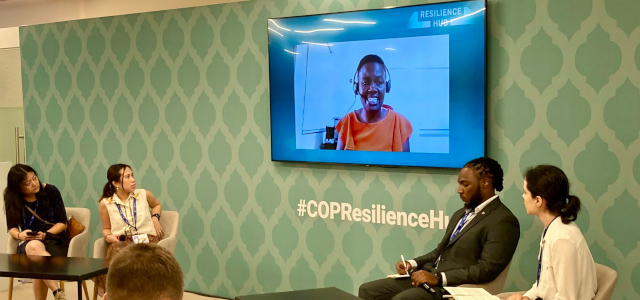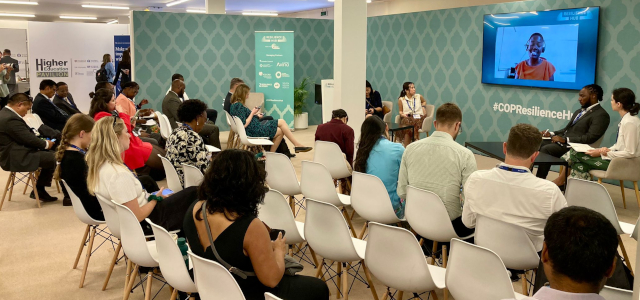This is according to the Programme’s coordinator in Tanzania Ms. Asha Mercy Msoka who spoke during a COP28 side event on 3 December titled “Water and Nature Resilience in the Climate Era: Innovative, Holistic and Effective Governance,” which sought to examine sustainable water and nature governance within an increasingly unstable climate. The session was co-convened by Water Youth Network, Arup, Climate Resilient Infrastructure Development Facility (CRIDF), Global Water Partnership (GWP), UN-Water and Indian Institute for Human Settlements (IIHS).
The GWL programme, a global initiative to support emerging leadership for improved water, sanitation and hygiene services, and climate resilience, is being implemented in various countries including Tanzania.
Speaking virtually during the side event, Ms Msoka said the GWL Programme in Tanzania has been instrumental in supporting the working groups under Tanzania’s National Multi-Stakeholders Forum, which identified challenges to climate-resilient integrated water resources management and developed response strategies.
“Water is a key enabler of other sectors, and its management and development cannot be dealt with in isolation. Different sectors have a direct and indirect influence on both the quantity and quality of water. The heart of our strategy lies in the National Multi-Stakeholders Forum, an embodiment of multi-sectoral collaboration in Tanzania. This Forum, with crucial support from the Global Water Leadership program, has brought together diverse sectors to forge a united front against water insecurity. The program has been instrumental in ensuring that the working groups of the Forum meet regularly, fostering consistent dialogue and collaboration among stakeholders,” said Ms. Msoka.

GWL Tanzania Coordinator Ms. Asha Mercy Msoka (virtual panelist) and other panelists discuss “Water and Nature Resilience in the Climate Era: Innovative, Holistic and Effective Governance.”
Tanzania through the working groups identified the following as the major bottlenecks to climate-resilient water resources management:
- Inadequate Funds to Implement Resilient Water Resources Investments,
- Inefficient Irrigation Water Uses and Practices in Ruvu Sub Basin, and
- Overlapping Legal and Regulatory Mandates Impacting Inter-Sectoral Coordination.
The identification of critical bottlenecks in water management was a pivotal outcome of this collaboration. Supported by the Global Water Leadership program, the working groups conducted thorough root cause analyses, unveiling the core issues challenging Tanzania’s water resources. This process led to the development of innovative strategies addressing these root causes, marking a significant step towards sustainable water management.
The Response Strategy also include a financial plan ensuring that the strategy is not only comprehensive in addressing issues but also viable and sustainable from a financial perspective and makes actionable and practical solutions for water security.
“Looking ahead, we believe the water sector will use the GWL’s approach to develop the Response Strategies is on implementing these strategies, continuously engaging stakeholders, and adapting to new challenges. The collaborative framework established, with the invaluable support of the Global Water Leadership program, sets a strong foundation for the sector’s future endeavors in enhancing water and ecosystem security through effective governance. The journey towards water resilience in Tanzania is a collaborative one, made stronger by the support of water sector development partners like the Global Water Leadership program. Act before water scarcity occurs, we are committed to ensuring a water-secure future for our nation,” emphasized the GWL coordinator.
